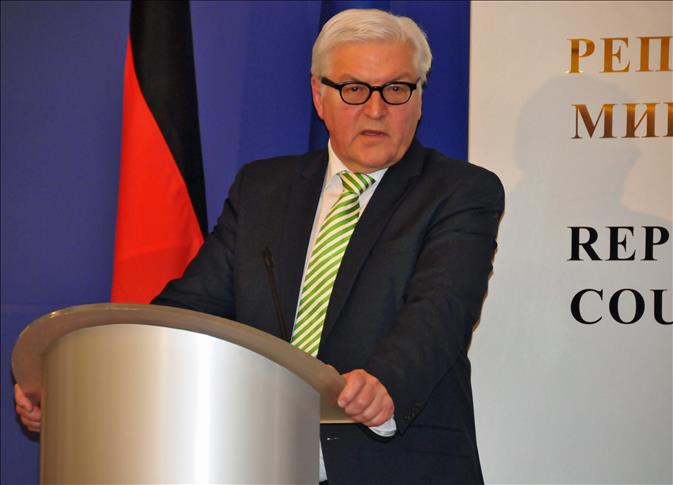
BERLIN
Germany favors a political solution in Yemen but also understands the concerns of Saudi Arabia which have led it to launch military action against Houthi rebels, Foreign Minister Frank-Walter Steinmeier has said.
Steinmeier criticized the Houthi rebels for launching attacks in the southern city of Aden, months after they have driven Yemen’s democratic government from the capital, Sanaa. Last September.
Steinmeier told German daily Bild in comments published on Friday: "President Hadi has asked neighboring Saudi Arabia for help against this serious threat. Yesterday, Saudi Arabia carried out air strikes against Houthi positions with support from the region.
"Against this background, I can understand Saudi Arabia’s actions."
Yemen's embattled President, Abd Rabbuh Mansour Hadi, fled southern Yemen after Houthis struck his residence in Aden earlier this week.
Steinmeier renewed his call for a political solution in Yemen and stressed that the Houthi rebels should stop violence.
“All those problems cannot be contained, let alone resolved, by violent means, neither from within nor from outside. What we need now is dialogue and negotiations,” he said.
'Broken arrangements'
Steinmeier sharply criticized the Houthi rebels for undermining peace efforts to date.
“Last year, all sides to the conflict concluded a peace agreement under the auspices of the United Nations. The Houthi rebels have since broken all arrangements. They are displaying utter ruthlessness and reject every political solution,” he said.
Asked about the role of Iran, which is accused by some Gulf countries of supporting the Houthi insurgency, Steinmeier said there has been some links, but the extent of the engagement was subject to different interpretations.
He voiced concern over growing tensions between the predominantly-Sunni Saudi Arabia and the Shiite Iran, and warned against a proxy war in Yemen.
Steinmeier said: "No one can have an interest in any further escalation, let alone a Saudi‑Iranian proxy war in Yemen, not even Riyadh or Tehran.
"One shudders to think of the consequences of such a confrontation, not just for the region as a whole but for global energy supplies."
"I don’t believe the stakeholders can have any interest in such a scenario," he said.
'Decisive phase'
The German foreign minister expressed hope that the recent tensions in the Gulf Region would not jeopardize the Iranian nuclear talks, which he said had entered a decisive phase.
He said: "So far, we have been able to shield the negotiations from the region’s crises. I hope we will be able to continue to do so.
"For the first time in more than a decade, a comprehensive agreement is within reach. We want a durable, reliable and verifiable agreement that prevents Iran getting its hands on a nuclear weapon."
Nuclear negotiations between Iran and the group of world powers called P5+1 continued in Lausanne on Friday.
Iranian Foreign Minister Mohammad Javad Zarif and U.S. Secretary of State John Kerry are expected to be joined by P5+1 foreign ministers over the weekend.
Positive outcome
The nuclear talks intensified recently due to concerns that failure to produce a framework deal before March 31 may jeopardize any positive outcome from a final agreement, which has a July 1 deadline.
The P5+1 countries claim Iran is developing nuclear weapons and want its program curbed in return for the lifting of sanctions.
Tehran insists its nuclear program is solely for peaceful purposes.
The deal sought by the six-member group would have Iran accept limits on its uranium enrichment capacity and would allow International Atomic Energy Agency inspections without interference.
Anadolu Agency website contains only a portion of the news stories offered to subscribers in the AA News Broadcasting System (HAS), and in summarized form. Please contact us for subscription options.







